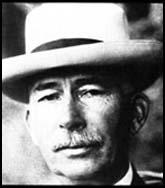Edward House

Edward Mandell House, the son of a banker, was born in Houston, Texas on July 26, 1858. He studied at Cornell University and afterwards returned to the family plantation on the death of his father in 1880.
A wealthy man, House was now able to concentrate on politics. A member of the Democratic Party he advised Texas governors including Charles A. Culberson (1895-1899), Joseph D. Sayers (1899-1903) and S.W. Lanham (1903-1907). A close associate of Woodrow Wilson, he helped him win the presidential campaign in 1912.
On the outbreak of the First World War, House became Wilson's personal representative in Europe. He visited most European capitals in 1915 and 1916 but his attempts at achieving a negotiated peace ended in failure. After the United States entered the war in 1917, House was responsible for working with Allied nations in order to organize manpower and supplies.
House worked closely with Woodrow Wilson and Walter Lippmann in drafting the Fourteen Points Peace Programme. House was a member of the USA's delegation to the Paris Peace Conference of 1919 and helped draw up the covenant of the League of Nations. Edward Mandell House died on March 28, 1938.
Primary Sources
(1) Sir Edward Grey, the British foreign secretary, met Edward House in the summer of 1914. He later wrote about the meeting in his autobiography Twenty-five Years (1925).
Earlier in the summer Colonel House had been in London, and I had seen him then. He had just come from Berlin, and he had spoken with grave feeling of the impression he had received there ; how the air seemed full of the clash of arms, of readiness to strike. This might have been discounted as the impression which would naturally have been produced on an American seeing at close quarters a continental military system for the first time. It was as alien to our temperament as to his, but it was familiar to us. We had lived beside it for years ; we had known and watched its growth ever since 1870. But House was a man of exceptional knowledge and cool judgment. What if this militarism had now taken control of policy ?
(2) Edward M. House, diary (29th June, 1919)
June 29, 1919: I am leaving Paris, after eight fateful months, with conflicting emotions. Looking at the conference in retrospect there is much to approve and much to regret. It is easy to say what should have been done, but more difficult to have found a way for doing it.
The bitterness engendered by the war, the hopes raised high in many quarters because of victory, the character of the men having the dominant voices in the making of the Treaty, all had their influence for good or for evil, and were to be reckoned with.
How splendid it would have been had we blazed a new and better trail! However, it is to be doubted whether this could have been done, even if those in authority had so decreed, for the peoples back of them had to be reckoned with. It may be that Wilson might have had the power and influence if he had remained in Washington and kept clear of the Conference. When he stepped from his lofty pedestal and wrangled with representatives of other states upon equal terms, he became as common clay.
To those who are saying that the Treaty is bad and should never have been made and that it will involve Europe in infinite difficulties in its enforcement, I feel like admitting it. But I would also say in reply that empires cannot be shattered and new states raised upon their ruins without disturbance. To create new boundaries is always to create new troubles. The one follows the other. While I should have preferred a different peace, I doubt whether it could have been made, for the ingredients for such a peace as I would have had were lacking at Paris
The same forces that have been at work in the making of this peace would be at work to hinder the enforcement of a different kind of peace, and no one can say with certitude that anything better than has been done could be done at this time. We have had to deal with a situation pregnant with difficulties and one which could be met only by an unselfish and idealistic spirit, which was almost wholly absent and which was too much to expect of men come together at such a time and for such a purpose.
And yet I wish we had taken the other road, even if it were less smooth, both now and afterward, than the one we took. We would at least have gone in the right direction and if those who follow us had made it impossible to go the full length of the journey planned, the responsibility would have rested with them and not with us.
